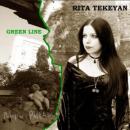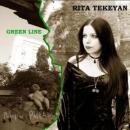The electricity is gone
They bombed the infrastructure
Even today we can’t watch Bel & Sebastien
Candle lights, romantic seating
Gas lamps like the ones in camping
No tent for romantic sleeping
Sometimes fluorescent lamps on car batteries going
The rich can afford their engines in the 80s
While everybody has ishtirak in the 90’s
For 10.000 lira per month
And Nora’s tree grew up high
Long queues waiting for water provision
Long queues waiting for bread submission
At five in the morning, the radio still going
Counting the number of dead
Counting the number of injuries
Counting the number of
Destroyed houses
Destroyed shops
Destroyed quarters
Destroyed bridges
Destroyed highways
The water is gone
They bombed the infrastructure
Even today we can’t take, our daily shower
Metal tanks, romantic dreaming
Plastic tanks like the ones in camping
No lift only romantic walking
Up to the fourth floor with gallons in their hands
The child carrying alone ten liters in the 80’s
While everybody calls the cistern in the 90’s
For 5.000 lira up to the fourth floor
And Nora’s tree, still grew up high
Long queues waiting for water provision
Long queues waiting for bread submission
At five in the morning, the radio still going
Counting the number of dead
Counting the number of injuries
Counting the number of
Destroyed houses
Destroyed shops
Destroyed quarters
Destroyed bridges
Destroyed highways
More dead, more injuries
More houses destroyed
The day repeats itself
And Nora’s tree
Still grew up high
They bombed the infrastructure
Even today we can’t watch Bel & Sebastien
Candle lights, romantic seating
Gas lamps like the ones in camping
No tent for romantic sleeping
Sometimes fluorescent lamps on car batteries going
The rich can afford their engines in the 80s
While everybody has ishtirak in the 90’s
For 10.000 lira per month
And Nora’s tree grew up high
Long queues waiting for water provision
Long queues waiting for bread submission
At five in the morning, the radio still going
Counting the number of dead
Counting the number of injuries
Counting the number of
Destroyed houses
Destroyed shops
Destroyed quarters
Destroyed bridges
Destroyed highways
The water is gone
They bombed the infrastructure
Even today we can’t take, our daily shower
Metal tanks, romantic dreaming
Plastic tanks like the ones in camping
No lift only romantic walking
Up to the fourth floor with gallons in their hands
The child carrying alone ten liters in the 80’s
While everybody calls the cistern in the 90’s
For 5.000 lira up to the fourth floor
And Nora’s tree, still grew up high
Long queues waiting for water provision
Long queues waiting for bread submission
At five in the morning, the radio still going
Counting the number of dead
Counting the number of injuries
Counting the number of
Destroyed houses
Destroyed shops
Destroyed quarters
Destroyed bridges
Destroyed highways
More dead, more injuries
More houses destroyed
The day repeats itself
And Nora’s tree
Still grew up high
inviata da Dq82 - 27/2/2023 - 17:31
×
![]()





Green Line
Ora questa cantante e compositrice nata in Libano pubblica (dopo il precedente Manifesto Anti-War del 2015 per Rosa Selvaggia (Obscure Label) il suo secondo disco intitolato Green Line. La Tekeyan in realtà è di origini armene e ha sempre avuto particolare attenzione al tema del genocidio armeno. Non a caso l’album è uscito il 24 aprile in occasione dell’anniversario dei 106 anni di questo tragico massacro. Il titolo “Green Line” si riferisce invece alla “linea verde” che divideva cristiani e musulmani nel corso della guerra civile in Libano. C’è un aspetto biografico nel suo insistere sull’argomento della guerra in quanto ha coinvolto lei e la sua famiglia. Si può dire che quello di Rita Tekeyan sia un tributo alle vittime di qualsiasi genocidio ed orrore perpetrato dalla guerra. Così la musica contenuta in Green Line cerca di dar voce alla memoria di eventi drammatici dimenticati che vengono esorcizzati in qualche modo attraverso la musica. Siamo di fronte ad un disco di canzoni che raggiungono quasi, nella loro intensità, una dimensione sacrale. Le sonorità sono caratterizzate dal piano, dall’elettronica e dalla bella ed espressiva voce di Rita Tekeyan. Per le tematiche trattate e anche (almeno come suggestione) per la voce può venire in mente il paragone con Diamanda Galas. Ma questo solo a livello di sensazione: in realtà Rita Tekeyan ha un suo linguaggio e una sua voce originale. Le atmosfere tendono all’oscurità e sono ammantate da una malinconia di fondo. Se ci lascia coinvolgere si rimane come rapiti dal pathos di queste canzoni che sembrano vivere in una dimensione atemporale. Credo che potenzialmente questo sia un disco che potrebbe piacere a molti, sia agli amanti del dark sia a chi segue la musica sperimentale e ama le atmosfere neoclassiche.
Nora’s Tree è un'altra canzone dedicata a Beirut, ed è un tributo ad un bellissimo albero piantato da una bambina di quattro anni. Durante gli anni della guerra l'albero è cresciuto ed è diventato più alto di un edificio di cemento armato di 4 piani; è sopravvissuto a più di 30 anni di guerra civile. La canzone descrive anche come le persone si adattano alla guerra, trovano soluzioni per sopravvivere, come le cose sono cambiate tra gli anni '80 e '90. La canzone denuncia come durante la guerra furono bombardate le infrastrutture: niente acqua, niente elettricità, strade e autostrade distrutte. Tutti i danni sono causati dalle mani dell’UOMO "... MAN MAN MAN ...", anche l’abbattimento dell’albero di Nora.